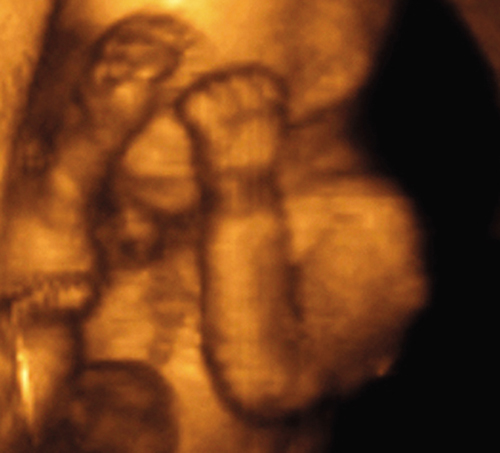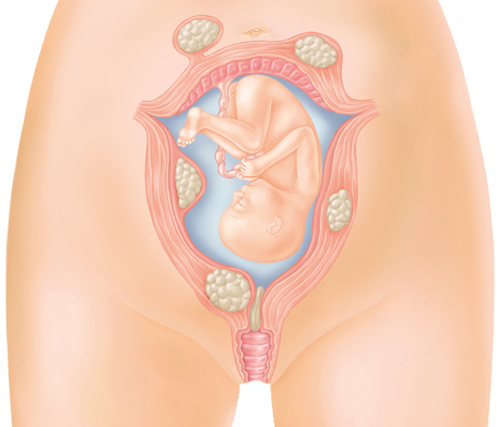You are 19 Weeks and 6 Days 141 days to go…
You’re likely to experience some backaches as your baby grows in size and your body continually adapts to accommodate her.
Your baby today
You will become much more aware of your baby moving as her size
and strength increase. You will not be aware of the more gentle
movements, or those movements that do not hit the side of the uterus.

The increasing weight of your developing baby,
and the fact that your joints and ligaments soften in pregnancy, can
cause backaches, but thankfully you don’t just have to put up with this
pain. There are many simple ways in which you can ease a backache or
even prevent it (see Banish backaches).
See your doctor to make
sure that the problem and its exact location is properly diagnosed. This
way you’ll have more chance of stopping it from becoming worse. A
common problem, often in later pregnancy, is sciatica—a sharp pain that travels down the back and leg.
Banish backaches
To nip backaches in the bud, try the following:
Take a warm bath or use a hot-water bottle on the painful area.
Ask your partner to give you a nice back rub, or get yourself a massage with an experienced prenatal practitioner.
Go to yoga or Pilates classes to strengthen your back muscles.
Watch your posture (see Pregnancy posture), and raise your legs when seated.
Ensure your car seat is properly positioned to support your back.
… Your health
Fibroids during pregnancy
In the second trimester,
fibroids—a benign mass of muscle fiber within the uterine wall, or
occasionally attached to it—can become problematic. Increased levels of
the hormones estrogen and progesterone during pregnancy encourage them
to grow along with the uterus.
In some
circumstances, the rapid growth of the fibroid causes feelings of
pressure, discomfort, or pain. Fibroids may increase a woman’s risk of
miscarriage, preterm birth, or having a baby in the breech position
which usually resolves the problem. Fibroids that do not cause
discomfort do not require treatment.
The fibroid will not
usually affect the developing baby, but if a large fibroid is
positioned low down in the uterus or near to the cervix it can prevent
the baby from descending into the pelvis, and a cesarean delivery will
be necessary.
Once the baby is born and the uterus shrinks, the fibroids will also usually shrink to their pre-pregnancy size.
Potential sites of fibroids

You are 20 Weeks Exactly 140 days to go…
Congratulations—you’re now halfway through your pregnancy. In around 20 weeks’ time, you’ll be a mom.
Your baby today
Although your baby may be sucking her thumb, this is a very
complex action that is not fully developed at this stage. For this
reason, your baby is as likely to put her fingers or toes in her mouth
as her thumb.

Does it seem like a lifetime, or has it flown by?
At least from now on, you really will be counting down. Hopefully, at
this halfway point you are feeling fine physically. You’re not yet
encumbered by a large belly and probably have a reasonable amount of
energy. Psychologically, you may still be very emotional, although you
will no doubt have gotten used to any mood swings by now (as will your
partner).
At this stage you
will continue going to prenatal appointments around every four weeks.
Remember, your doctor is there to monitor your health and your baby’s
progress, but also to help, so get her advice on how to deal with some
of the discomforts you might experience as you grow bigger.
The gestation period for an elephant is an incredible 22 months, making it the longest of any land animal.
In addition to this,
the common birth weight for elephants is 260 lb (120 kg). So, if your
pregnancy is already starting to feel long, and your baby a tad heavy,
spare a thought for our large-eared friends!
… Doctor
| Q: |
I haven’t felt my baby move yet. Should I be worried?
|
| A: |
While you understandably want to feel your baby’s movements,
there is no cause for concern yet since your recent scan should have
shown you that all is well with your baby.
If it’s your first
baby, you may not notice the early movements since you won’t know what
to expect. Also, if you’re an active person, these slight flutters may
be missed. Women with a placenta lying at the front of the uterus may
feel movements later, as may larger women since the movement may not be
detected through the flesh.
Once you do
feel movements, don’t become too focused on every one. It’s not until
around 28 weeks that it becomes important to monitor the pattern. From
this stage, the amount your baby moves, as well as the type of movement
and when it happens, are relevant since these indicate that the placenta
is sustaining the pregnancy and your baby’s muscles are developing.
If you’re concerned about lack of movement from your baby at any stage, speak to your doctor.
|
Sitting correctly
Good posture can help to minimize pregnancy discomforts, including backaches . When seated, make sure your lower back is supported by the back of the chair and keep your feet flat on the floor (see image).
Yoga is a great way to
learn to hold your body correctly, including how to keep your spine
aligned and your lower back supported.
Sit upright on a chair
with your legs wide apart and your feet firmly on the floor to align
your spine. Make sure your lower back is resting against the chair.
